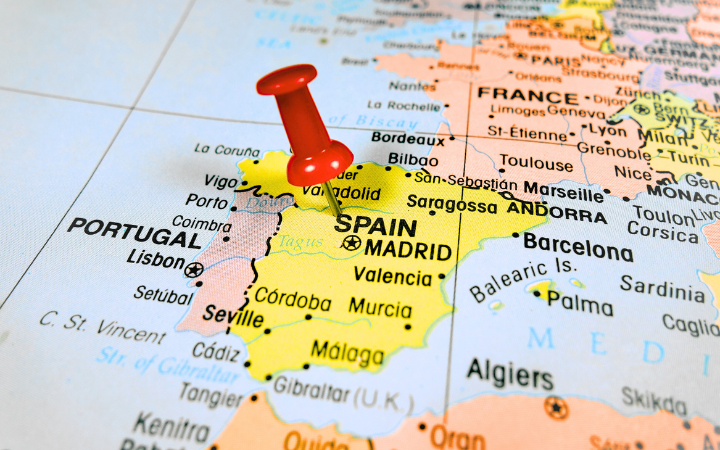
Relocating to Spain: How to Get a Digital Nomad Visa

Dreaming of working from sunny Spain? Do you know about the Spanish digital nomad hubs? We’ve got you covered! The Spanish government introduced a digital nomad visa, making it easier for non-EU residents to live and work in Spain. In this guide, we will explore the essentials of relocating to Spain and applying for the digital nomad visa. Ready to experience the Spanish lifestyle firsthand? Let’s go!
Why Choose Spain as a Digital Nomad Destination?
There are good reasons why Spain has become a popular destination for digital nomads. In this blog we are highlighting some of those benefits for you. When you’re ready for the next steps, book a free consultation and learn how we will help you make your life in Spain happen!
There are good reasons why Spain has become a popular destination for digital nomads. In this blog we are highlighting some of those benefits for you. When you’re ready for the next steps, book a free consultation and learn how we will help you make your life in Spain happen!
High Quality of Life
Spain ranks as one of the top countries for quality of life. The main reasons are its natural beauty, vibrant cities and a culture that values community, health and enjoying life socially. Let’s not forget that Spain is especially well known for its beautiful, sunny and mild weather that allows everyone to spend a lot of time outdoors.
Spain ranks as one of the top countries for quality of life. The main reasons are its natural beauty, vibrant cities and a culture that values community, health and enjoying life socially. Let’s not forget that Spain is especially well known for its beautiful, sunny and mild weather that allows everyone to spend a lot of time outdoors.
Affordable Cost of Living
Compared to many Western European cities, the cost of living in Spain is very reasonable. Spain has a wide range of housing options to suit different budgets in cities such as Barcelona, Madrid, Valencia, Sevilla, Galicia, Malaga, etc.
Compared to many Western European cities, the cost of living in Spain is very reasonable. Spain has a wide range of housing options to suit different budgets in cities such as Barcelona, Madrid, Valencia, Sevilla, Galicia, Malaga, etc.
Work-Life Balance
Spaniards value work-life balance and this lifestyle is attractive to many remote workers who want to enjoy life outside of work. Spain’s culture encourages enjoying time with friends and having a very social community. If you want to know more about how I create my work-life balance while working remotely check out my latest blog ’Mental Health Matters While Finding Harmony with Remote Work’.
Spaniards value work-life balance and this lifestyle is attractive to many remote workers who want to enjoy life outside of work. Spain’s culture encourages enjoying time with friends and having a very social community. If you want to know more about how I create my work-life balance while working remotely check out my latest blog ’Mental Health Matters While Finding Harmony with Remote Work’.
Digital Nomad Community
Spain has a growing network of digital nomads and remote workers. In major cities, you’ll find coworking spaces, networking events and a supportive community of like-minded professionals. Interested in learning more about the best Spanish digital nomad hubs? You don’t have to wait to begin exploring your options, book a free session with our team and we will help you get started!
Spain has a growing network of digital nomads and remote workers. In major cities, you’ll find coworking spaces, networking events and a supportive community of like-minded professionals. Interested in learning more about the best Spanish digital nomad hubs? You don’t have to wait to begin exploring your options, book a free session with our team and we will help you get started!
Overview of the Digital Nomad Visa for Spain
Spain’s digital nomad visa is designed for non-EU citizens who work remotely and want to live in Spain for at least a year as a legal resident.
Spain’s digital nomad visa is designed for non-EU citizens who work remotely and want to live in Spain for at least a year as a legal resident.
Who Can Apply?
If you are a remote employee, freelancer, self-employed or a business owner you may be eligible to apply for this visa. Whether you’re a software developer, recruiter (like me!), consultant, writer, or other type of remote worker, you may qualify.
If you are a remote employee, freelancer, self-employed or a business owner you may be eligible to apply for this visa. Whether you’re a software developer, recruiter (like me!), consultant, writer, or other type of remote worker, you may qualify.
Key Benefits for residency, taxes and family
The digital nomad visa allows you to stay in Spain for up to one year. To stay in the country beyond the first year, you must apply for a residence permit. Visa holders may also benefit from favorable tax rates, and you can find more information about taxes in Spain from a qualified immigration lawyer or law group.
The digital nomad visa allows you to stay in Spain for up to one year. To stay in the country beyond the first year, you must apply for a residence permit. Visa holders may also benefit from favorable tax rates, and you can find more information about taxes in Spain from a qualified immigration lawyer or law group.
Other benefits are that your partner and children can obtain this visa as well, and you can apply for a Spanish residence permit, which will allow you to travel around Europe.
Eligibility Criteria for the Digital Nomad Visa
Considering you will stay for a year, you will need a valid passport with one-year validity and two blank pages. Here is an overview of some of the other requirements of this visa.
Considering you will stay for a year, you will need a valid passport with one-year validity and two blank pages. Here is an overview of some of the other requirements of this visa.
Professional Experience
You need to have an undergraduate or postgraduate degree from a University, College or Business School of prestige, or have at least 3 years of work experience in your current field of activity.
You need to have an undergraduate or postgraduate degree from a University, College or Business School of prestige, or have at least 3 years of work experience in your current field of activity.
Minimum Income
You need to prove that your minimum income is 200% of Spain’s minimum wage which is approximately €2650 per month and you are planning to bring your partner and/or children, you will need proof of a higher income. Always confirm the latest requirements with a Spanish immigration lawyer or professional. You can also find more information here.
You need to prove that your minimum income is 200% of Spain’s minimum wage which is approximately €2650 per month and you are planning to bring your partner and/or children, you will need proof of a higher income. Always confirm the latest requirements with a Spanish immigration lawyer or professional. You can also find more information here.
Criminal Background Check
You need to submit the original and a copy of the criminal record certificate issued by your country of residence for the past 2 years. This is also known as a criminal background check and you must submit one that is a maximum of 6 months old, but always confirm the latest requirements in case it changes.
You need to submit the original and a copy of the criminal record certificate issued by your country of residence for the past 2 years. This is also known as a criminal background check and you must submit one that is a maximum of 6 months old, but always confirm the latest requirements in case it changes.
Health Insurance
You must include in your application proof that you have paid for health insurance from an entity authorized to operate in Spain. The insurance policy must cover all the risks insured by Spain’s public health system.
You must include in your application proof that you have paid for health insurance from an entity authorized to operate in Spain. The insurance policy must cover all the risks insured by Spain’s public health system.
Be aware that the requirements to apply for this visa may vary depending on your country of origin (your home country that issued your passport). Please only trust the official website of the Foreign Matters of Spain or your immigration lawyer.
To check the requirements based on your country of origin, start here on the Spanish government’s website. The name of your country will be written in Spanish on this website. Once you have found your country, click on the name of your nearest consulate. On the top yellow line, click on “consular services”. It will show a list of services. Consult your immigration lawyer, consulate or our team if you have questions.
Step-by-Step Guide to Applying for the Digital Nomad Visa
To help you navigate the application process, here’s a step-by-step guide on how to apply for Spain’s digital nomad visa.
1. Gather Your Documents
Collect all the documents you need: proof of income, criminal background check, health insurance, etc.
Collect all the documents you need: proof of income, criminal background check, health insurance, etc.
2. Submit Your Application at the correct Spanish Consulate
Apply from your home country by visiting the nearest Spanish consulate or embassy. You may need to make an appointment in advance. Consult your immigration lawyer and plan ahead.
Apply from your home country by visiting the nearest Spanish consulate or embassy. You may need to make an appointment in advance. Consult your immigration lawyer and plan ahead.
3. Receive Approval and Enter Spain
Once your application is approved, you can enter Spain on your digital nomad visa. Approval times may vary, so check with your consulate and immigration lawyer for an estimated waiting period and apply well before your planned move.
Once your application is approved, you can enter Spain on your digital nomad visa. Approval times may vary, so check with your consulate and immigration lawyer for an estimated waiting period and apply well before your planned move.
4. Register in Spain and Obtain Your Residence Card (TIE)
Upon arriving in Spain, you’ll need to register and apply for a residence card, known as a TIE (Tarjeta de Identidad de Extranjero). You can do that in your nearest Oficina de Extranjería.
Upon arriving in Spain, you’ll need to register and apply for a residence card, known as a TIE (Tarjeta de Identidad de Extranjero). You can do that in your nearest Oficina de Extranjería.
Living in Spain as a Digital Nomad
Here are some tips and advice to help you transition into your new Spanish life.
Here are some tips and advice to help you transition into your new Spanish life.
Housing
Start with short-term rentals to get familiar with your city and explore neighborhoods. I use HousingAnywhere to find mid-term accommodation for my digital nomad trips.
Start with short-term rentals to get familiar with your city and explore neighborhoods. I use HousingAnywhere to find mid-term accommodation for my digital nomad trips.
Coworking Spaces
Spain’s major cities are packed with coworking spaces where you can work productively and network with other professionals. There are many resources to find the best coworking spaces in Spain, I like to get recommendations from friends, colleagues and other travellers.
Spain’s major cities are packed with coworking spaces where you can work productively and network with other professionals. There are many resources to find the best coworking spaces in Spain, I like to get recommendations from friends, colleagues and other travellers.
Healthcare
Digital nomad visa holders are required to have private health insurance, but you may eventually be eligible for Spain’s public healthcare if you extend your stay. Search for long stay travel insurance and choose the most convenient one according to your needs. Make sure you choose an approved health insurance for your visa. Unfortunately, things can happen and you may need help, so make sure you are fully covered.
Digital nomad visa holders are required to have private health insurance, but you may eventually be eligible for Spain’s public healthcare if you extend your stay. Search for long stay travel insurance and choose the most convenient one according to your needs. Make sure you choose an approved health insurance for your visa. Unfortunately, things can happen and you may need help, so make sure you are fully covered.
Language Tips
While English is common in major cities, learning Spanish can make daily interactions easier, especially in smaller towns. Meetup offers tons of opportunities for you to do some language exchange in Spain.
While English is common in major cities, learning Spanish can make daily interactions easier, especially in smaller towns. Meetup offers tons of opportunities for you to do some language exchange in Spain.
Important Tips and Common Pitfalls
Here are some final tips to help you avoid common issues and get the most out of your time in Spain.
Here are some final tips to help you avoid common issues and get the most out of your time in Spain.
Tax Implications
Long-term residents will likely have tax obligations in Spain. Be smart, consult a tax professional to understand how living in Spain could affect your taxes, especially if you stay for more than 183 days in a year. For managing your taxes in Spain, consult a “Gestoría” close to where you live.
Long-term residents will likely have tax obligations in Spain. Be smart, consult a tax professional to understand how living in Spain could affect your taxes, especially if you stay for more than 183 days in a year. For managing your taxes in Spain, consult a “Gestoría” close to where you live.
Visa Renewal
The initial visa will be valid for 1 year. You can renew it if you meet the income and employment requirements, potentially extending your stay in Spain up to five years.
The initial visa will be valid for 1 year. You can renew it if you meet the income and employment requirements, potentially extending your stay in Spain up to five years.
Connect with the Community
Spain has many groups and events for digital nomads and expats. Join online communities, attend local meetups and network with others in the digital nomad community.
Spain has many groups and events for digital nomads and expats. Join online communities, attend local meetups and network with others in the digital nomad community.
Cultural Differences
Spain has a unique cultural rhythm, including naps (we love siestas!) and a relaxed approach to punctuality. Embrace these differences and you’ll find it easier to adapt to Spanish life.
Spain has a unique cultural rhythm, including naps (we love siestas!) and a relaxed approach to punctuality. Embrace these differences and you’ll find it easier to adapt to Spanish life.
Ready to learn more about life in Spain?
Relocating to Spain as a digital nomad can be an exciting journey filled with new experiences and opportunities. With the digital nomad visa, Spain has made it easier than ever for remote workers to live in this beautiful country long-term. If you’re ready for a change and dream of living in Spain, now is the perfect time to start gathering your documents and exploring this unique visa option.
Relocating to Spain as a digital nomad can be an exciting journey filled with new experiences and opportunities. With the digital nomad visa, Spain has made it easier than ever for remote workers to live in this beautiful country long-term. If you’re ready for a change and dream of living in Spain, now is the perfect time to start gathering your documents and exploring this unique visa option.
For those seeking guidance on finding a remote job and starting your digital nomad journey, Allora Collective is here to help. We support clients who want to transition to a remote work lifestyle, helping them find the right job opportunities and prepare for a successful move.
Spain is my home country and as a digital nomad I have been to 30+ countries. I help people build their tech careers as a tech recruiter, create their digital nomad life and design remote career strategies with the Allora team so our clients can live the life they’re dreaming of.
Book a free session with our team to discuss your plans, get tailored advice on finding remote work and take the first steps toward your Spanish journey. The adventure of a lifetime awaits. ¡Hasta pronto!
Isabel Dorado
Isabel has traveled to more than 30 countries as a Digital Nomad, hiring global talent for Tech, Product, Data, and Operations across Europe, LATAM, and India. Her native language is Spanish, she is fluent in English and specializes in tech careers and transitioning to digital nomadism.



